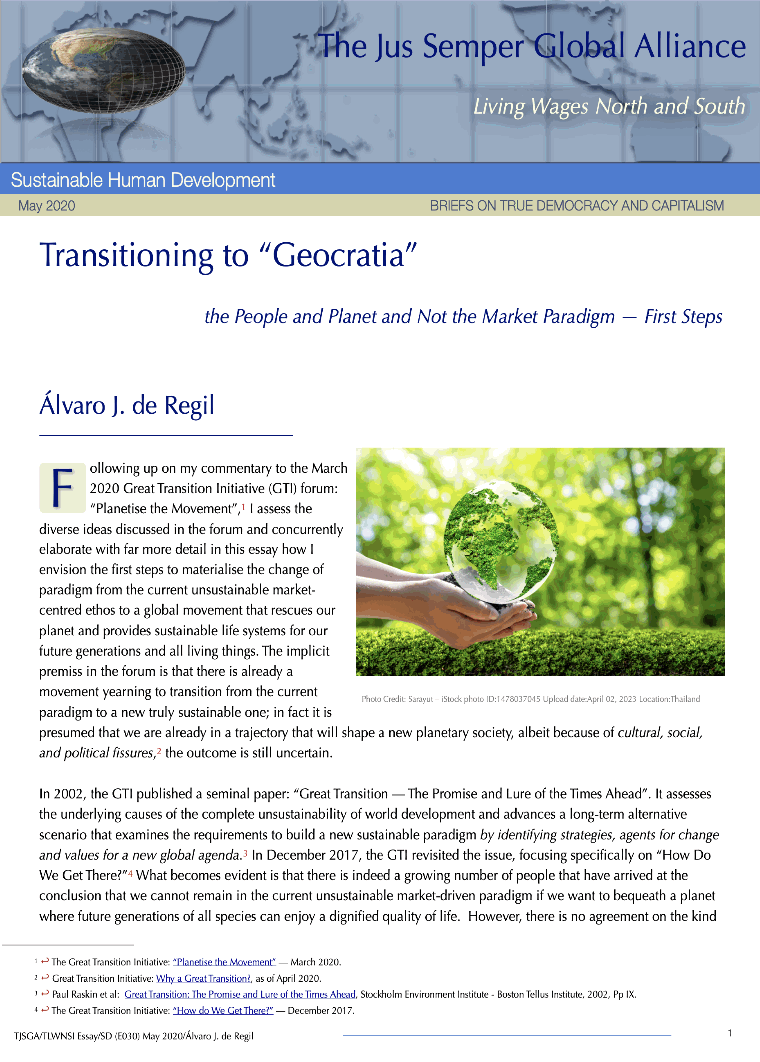Transitioning to Geocratia
the People and Planet and Not the Market Paradigm — First Steps
Álvaro J. de Regil
Following up on my commentary to the March 2020 Great Transition Initiative (GTI) forum: “Planetise the Movement”,1 I assess the diverse ideas discussed in the forum and concurrently elaborate with far more detail in this essay how I envision the first steps to materialise the change of paradigm from the current unsustainable market-centred ethos to a global movement that rescues our planet and provides sustainable life systems for our future generations and all living things.
Parting from the fact that saving Planet Earth, our home, changes everything, we need to build a new ethos where the majority of humankind commits to a system whose only purpose is the pursuit of the welfare of people and Planet Earth. This requires that all Earth resources necessary for the enjoyment of life of all living things be managed to achieve true long-term sustainability. Beginning with removing the market from its encroachment of the institutions of society, this is a paradigm that will break many of the structures, beliefs and notions that we now regard as permanent into a sort of Geocratia—from Greek ge and kratos: government of the or by the Earth—which is the name I chose to refer to the new paradigmatic proposal. As you may expect, saving the planet will radically change our consumer-driven cultural frameworks and life systems, including the standards of living, consumption habits, use of energies, economic indicators, the conception of development, progress, growth and the concept of democracy. We do not know yet, but this may include a reconfiguration of the so-called nation states to give way to the formation of smaller social and geographical identities. Essentially, we must establish a new global citizens’ contract between us and Mother Earth, where we commit to design new structures of social organisation devoted to living in harmony with our planet, where the use of the resources necessary for life will be managed so that consumption does not happen faster than the time required by the planet to replenish them. Concurrently, by building Geocratia’s ethos we achieve happiness, peace and freedom, as in Epicurus’ ataraxia, the enjoyment of peace, absence of fear and happiness, and aponia, the absence of pain.
This paper argues that the underlying causes of the unsustainability of market societies belong solely to the intrinsic nature of capitalism, and of the unrelenting pursuit of the reproduction and accumulation of wealth, which requires the infinite consumption of resources, with no regard whatsoever for its impact on the economic, social and environmental dimensions. It also probes to demonstrate that this is completely incompatible—a true oxymoron—with the premiss of transitioning to a truly sustainable, democratic, equitable, peaceful and ecological paradigm. Lastly, this essay explores the key characteristics of the disastrous trajectory that we are still following, what we need to do to radically veer towards a sustainable path, my vision of where we should set course and the first steps to materialise a planetary movement to take us there. For a full read of this brief, click here or on the picture to download the pdf file. |






